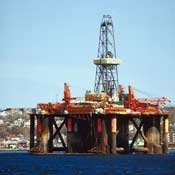If Mississippi's own tourism website touts the pristine beaches, dunes and endangered wildlife-viewing on the Gulf of Mexico barrier islands, Capt. Louis Skrmetta can't understand why the state wants to muck it up with gas-drilling rigs.
"It's like a mini-cruise to an exotic Carribbean island. They love the fact that there are no roads, no automobiles," said Skrmetta, who runs a ferry from the mainland to the islands.
He said vistas dominated by hulking drilling platforms and the constant droning of helicopters would ruin the experience.
Last week, the Mississippi Development Authority held two sessions for people to file public comments on the draft rules for gas surverying and drilling in the Gulf of Mexico.
With less than one month left in office, Gov. Haley Barbour primed the pump for oil and natural gas drilling to take place off the Mississippi Gulf Coast by ordering MDA to publish the rules. He indicated that the drilling would boost Mississippi's revenue. Starting in 2017, the federal government receives 65 percent of royalties that companies pay if they discover oil or gas; Mississippi gets the remaining 35 percent of the royalty, Barbour said. If companies were permitted to drill in state-owned waters, however, Mississippi would be able to pocket the full amount of the royalty.
Dan Turner, spokesman for MDA, said there could be 350 billion cubic feet of untapped natural gas off the Mississippi coast. The rules will be finalized after the public-comment period ends Jan. 31 and a one-month waiting period, Turner said.
But Mississippi's gas reserve represents just one-seventeenth of neighboring Alabama's 6.5 trillion cubic feet, according to an analysis by Jeffrey K. Bounds, an Massachusetts Institute of Technology-trained electrical engineer and Mississippi native.
"We understand the economy is bad, and everyone wants a free lunch. And we'd like to believe that elected officials supporting drilling are just not paying attention to the beat of the market drum, or are simply so desperate and panicked that they are making bad choices. But in this case the facts are plain enough that we believe citizens need to start asking state officials at least this simple question: Why now? Who profits? It is clear that it will not be residents of the state," Bounds writes.
Andrew Whitehurst, assistant director of science and water policy for the Gulf Restoration Network, took issue with what he characterized as MDA's hurried public comment process.
"The way that they've done this, putting out their notice during the Christmas holidays was unfair," he said. "When you're a state agency considering something this big and this controversial, and you choose that time of year to publish your rules, you're trying to hide from controversy."



Comments
Use the comment form below to begin a discussion about this content.
comments powered by Disqus